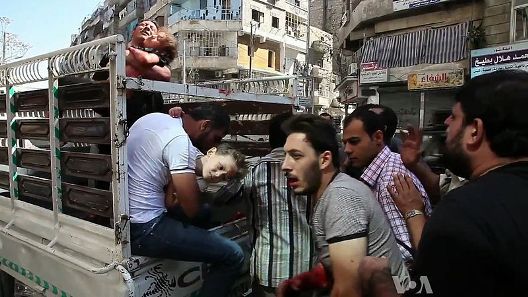 Save for the efforts of humanitarian agencies operating inside Syria and along its borders, the international community has done little but bear witness to the plight of those caught in the maelstrom. Syrians feel abandoned and hopeless. The overwhelming imperative is for the parties, influential states and the international community to work to ensure the protection of civilians. In particular, as set out in Security Council resolution 2139, parties must lift the sieges and allow unimpeded and safe humanitarian access.
Save for the efforts of humanitarian agencies operating inside Syria and along its borders, the international community has done little but bear witness to the plight of those caught in the maelstrom. Syrians feel abandoned and hopeless. The overwhelming imperative is for the parties, influential states and the international community to work to ensure the protection of civilians. In particular, as set out in Security Council resolution 2139, parties must lift the sieges and allow unimpeded and safe humanitarian access.
—Oral Update of the Independent International Commission of Inquiry on the Syrian Arab Republic, March 18, 2014.
Reporting to the Human Rights Council, the commission delivered yet another damning indictment of those in Syria—mainly the Assad regime—whose criminal rampage against defenseless civilians continues with carefree impunity. Although some headline writers have editorialized that the commission’s report condemns “both sides,” anyone actually reading the text will see the overwhelming weight of the indictment falling first on the regime and then on the al-Qaeda affiliated ISIS: two sides of the same terrorist coin. The misleading plague on all houses commentary is transparent in its intent: to rationalize and justify inaction in the face of mass murder whose effects are genocidal. It is a tactic that was employed promiscuously and shamelessly in twentieth century episodes of mass murder in faraway places. If, after all, all parties are guilty of heinous criminal acts, who is one supposed to support?
The report pulls no punches. ISIS, which concentrates its energy and resources on battling armed elements that actually engage the Assad regime in combat, stands accused of murder, torture, spreading terror among civilians, attacking protected objects, attacking religious property and clergy, and deliberately targeting areas used as gathering points for civilians. Despite being denied access to Syria by an entity purporting to be Syria’s legal government—an entity recognized as such by the United States—the commission was nevertheless able to document the most egregious criminal behavior of ISIS during the period January 20-March 10, 2014. Although ISIS was not the only non-governmental armed group cited by the commission for criminal actions, its depredations dominate the report’s non-governmental side of the ledger.
That which dominates the report itself, however, is the updated account of the Assad regime’s brutally systematic war on Syrian civilians. No one serving now in the so-called Syrian Arab Republic Government—including a foreign minister convalescing in Lebanon—can credibly claim to be unaware of the criminality they are facilitating. The bill of particulars is striking:
“As previously determined, torture, cruel, inhumane, degrading treatment or punishment have been perpetrated by Government forces as part of a widespread and systematic attack directed against a civilian population pursuant to or in furtherance of a State policy, amounting to a crime against humanity.”
“Sexual violence against women and men in Government detention continues. Multiple cases of sexual assault against women in detention were reported in detention centers in Damascus.”
“Up to a million children are estimated to be living under siege or in areas without humanitarian assistance in Syria. Civilians evacuated from Yarmouk camp in Damascus reported that the majority of children were malnourished and several had starved to death in December 2013.”
“Government helicopters hovering at high altitudes have dropped scores of barrel bombs, improvised explosive devices… In many instances there was no clear military target in the proximity of the area attacked… The use of barrel bombs in this context amounts to ‘area bombardment,’ prohibited under international humanitarian law. Such bombardment spreads terror among civilian populations.”
“In attacks on hospitals, medical units and health-care personnel, the Government violated binding international humanitarian law to care for the sick and wounded and committed the war crime of attacking protected objects.”
“The Syrian government has failed to fulfill its core obligation under the right to life, adequate food, and the right to the highest attainable standard of health, besieging areas in violation of international humanitarian law.”
“The Government continues to rely on its superior firepower, including its control of the skies. It has benefited from the intervention of foreign fighters, many of whom have an official presence in Syria. Others, notably insurgents crossing over from Iraq, are clandestinely fighting in concert with the army and with the pro-Government militia.”
According to United Nations personnel, Secretary-General Ban will report to the Security Council next week that the Syrian government has taken no substantive steps to comply with the Council’s demands pursuant to Resolution 2139. If Ban’s report inspires—as it should—a follow-on resolution aimed at enforcing 2139, no doubt a Russian veto will follow. Neither Moscow nor Tehran lack information about the extent and the consequences of the criminality they are abetting. What they lack is any sense of obligation to do something about it. Sadly, in this they are not alone.
Frederic C. Hof is a resident senior fellow with the Atlantic Council’s Rafik Hariri Center for the Middle East.
Image: Wounded civilians arrive at a hospital in Aleppo during the Syrian civil war, October 2012. (Photo: Wikimedia)
